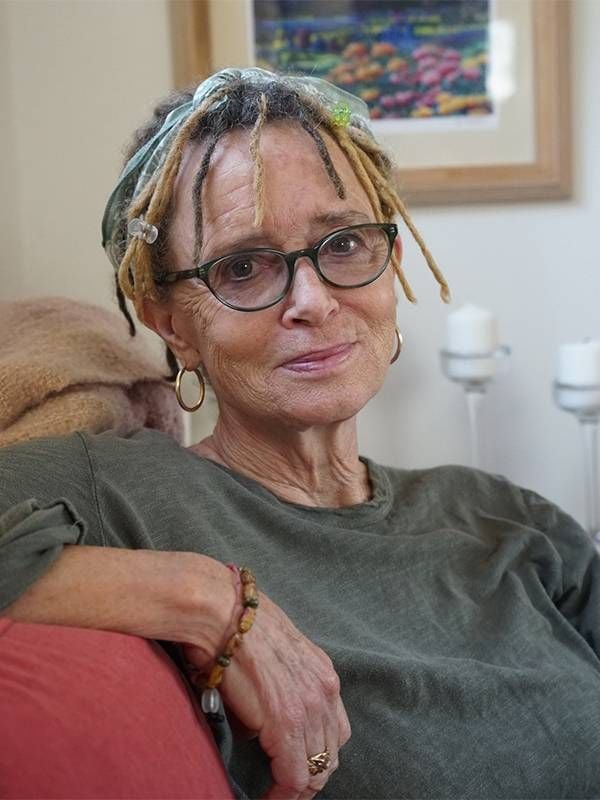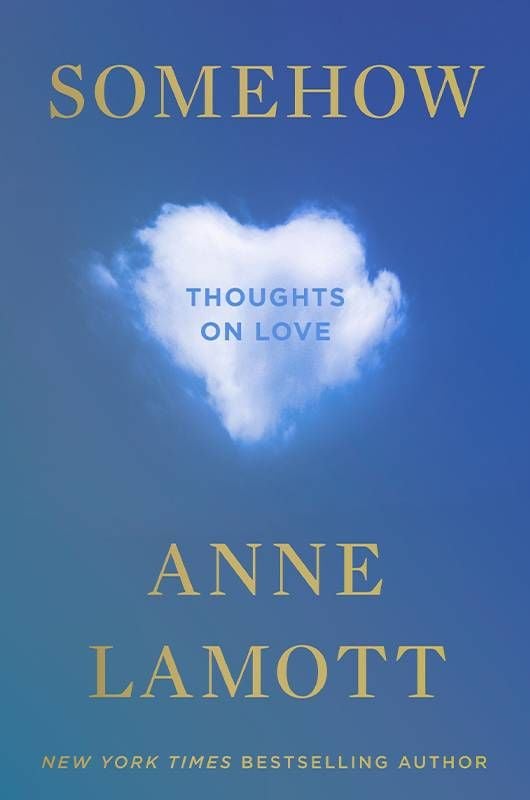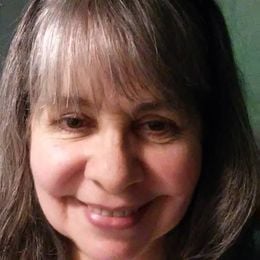Anne Lamott Says 'We're All Going To Be Okay'
In her new book, 'Somehow: Thoughts on Love,' Anne Lamott writes about 'radical self-love' and offering each other 'love and listening'
"Life is such a mystery that you have to wonder if God drinks a little."

It's bon mots like this one (lifted from her latest book) that have made Anne Lamott such a beloved author — indeed, a national treasure.
"Radical self-love for me means love in the face of seeing very clearly my character flaws and the mistakes I've made."
Lamott started out writing fiction — her first novel, "Hard Laughter," was published in 1980 — but she's best known for her unflinchingly honest, autobiographical nonfiction.
Lamott writes about her struggles with alcohol and drugs (she's been clean and sober for almost four decades) and her anxiety (which still plagues her). She tells us about her deeply-held religious convictions and her Christian-informed left wing politics. She confesses her ongoing and sometimes embarrassing screw-ups and regrets. She lays it all out — our magnificent, flawed humanness — and then she showers us with hope in stories of grace and redemption and hard-won wisdom.
And she does all of this with an irresistible alchemy of candor and wicked-funny, self-deprecating humor. You can't really help feeling better about yourself — and the world! — after reading a bit of Lamott's writing. Seems we all could use that right about now.
Lamott spoke to Next Avenue about her new book (her 20th), Somehow: Thoughts on Love (Riverhead Books, 2024), which will be released on April 9 and is currently available for pre-order.
Next Avenue: You've written books on faith, grace, mercy, hope, courage and more. Why did you write your latest book on love?
Anne Lamott: Because I'm older and I understand I'm on borrowed time, I wanted a chance to put down everything that I know for sure, everything that has ever helped in the last 70 years and that will almost certainly help again for my son and grandson, no matter what their future holds.
And everything I know leads back to love.
You write about radical self-love in "Somehow." Can you tell us what radical self-love is and why it's so important?
Radical self-love for me means love in the face of seeing very clearly my character flaws and the mistakes I've made. To just love and accept that, to say, well it makes sense that I'm this way and I always was and I probably ever more shall be and I'm just going to love this one perfectly imperfect person. And I know that that is quantum, that self-love radiates outward and then, you know, more love in the world!
It's the hardest work of all to love and forgive myself 'as is.' But when we come from that place of love and acceptance, the whole world changes.
"It's the hardest work of all to love and forgive myself 'as is.'"
Do you think your confessional style — your willingness to bare your soul — is part of why your books are so accessible and therapeutic?
Well, they're therapeutic for me, I'll tell you that!
I think what's so therapeutic is when I share these stories the point is usually that we're all pretty much the same, you know, that we're all worried about being needy or neurotic or flawed and secretly that we're losers. That's what I think everyone fears — that we're secretly losers.
And I think that's so therapeutic, when someone that you like or respect will tell you that they're just as crazy as you are, you know? Oh my god, what a relief! What a miracle. I thought I was kind of uniquely screwed up or uniquely a fraud.
You're invariably candid about your strong Christian faith in your books. "Somehow" is no different. Can you talk a bit about your religious beliefs?
I'm very honest about the fact that I'm a Sunday School teacher. I teach the kids that God is love. And love is God. And God loves. Period.
But I've never really thought of myself as a born-again Christian. For me fundamentalism in every religion, in every form, is the literal scourge of the planet Earth. I think you can trace back every crisis, catastrophe, every desolation and grief to fundamentalists in any religion.
"But everyone, at least that I know, has a few people that they can call who will not judge them, who will love and listen."
But I really love Jesus! I can tell you I have about maybe a second grader's theological understanding. I don't think in terms of the triune nature of the deity. I just think about Jesus and that his message was radical: love for the poor.
I pretty much stick with that.
You say in your book that the most universal human fear is that, once someone really knows us, they'll discover we are not lovable. You also mention how, 30 years ago, your mentor and friend told you 'Honey, you are preapproved.' Do you think we all need a friend who will tell us that we are 'preapproved?'
I think we all have one or two people like that — and that's the miracle.
The greatest miracle of my entire life is that I've always had a small handful of people who just love and accept me and have spiritual and psychological wisdom who [if I'm having a bad day will say], 'oh honey, do you want a cup of tea? Why don't you come over?' Or they'll say the magic words, 'do you want to go to Target?'
You mention Target a lot!
Yeah, you can go there with $20 and change your whole reality. You can get a new pair of socks and a new lipstick and still have money for Starbucks!
But everyone, at least that I know, has a few people that they can call who will not judge them, who will love and listen.
"I write thousands of postcards [to voters] every election cycle. And I say this is about women's rights, this is about basic human liberties under the constitution."
That's all we have to offer each other: love and listening.
In your book you point out that 'nobody in isolation becomes who they were designed to be.' How important are our friends, our bowling leagues, our book groups, our churches — the communities in our lives?
To me they are really everything. I feel that they've kept me alive.
When I staggered into St. Andrew's [Lamott's progressive Presbyterian parish] in 1985, very drunk and hungover, they gave me life. They didn't try to get me to sign on to anything or believe anything. They just let me come in and be there. And they said, like I write about in this book, 'I'm glad to see you.'
And that was where my convictions about community began. It's that if you can offer people a chair in a warm room, you know a warm, well-lighted room and a glass of water, you can save that person's life. It saved mine.
We ran an article recently about "election stress disorder" that details how stressed out and anxious Americans are about the upcoming election. How are we going to make it through this year, Anne Lamott?

Well, we're going to do what we always do. I started out saying the [purpose of this] book was to leave, for my son and grandson when I'm gone, every action we can take that has always worked before and almost certainly will again, no matter what their future holds — whether it's Trump or the deepening climate crisis.
And the things that have worked are community, the picking up the phone and saying, 'I am currently not okay — I'm in terror.' Because the whole system of 'us' works because we're not all crazy on the same day.
I change the channel from the doom machine to what I can actually do. I can help register voters, I can donate. I write thousands of postcards [to voters] every election cycle. And I say this is about women's rights, this is about basic human liberties under the constitution.
I spend time with trusted friends. If I need a laugh, I talk to someone who's funny. I go to Target or take a nap. And sometimes when all else fails, I go around the neighborhood and pick up litter.
Is there one thing you'd like your readers to take away from this book?
I want people to believe that they are loved 'as is' and that we're going to be okay if we stick together and we just keep doing the next right thing.
We're going to be okay.


